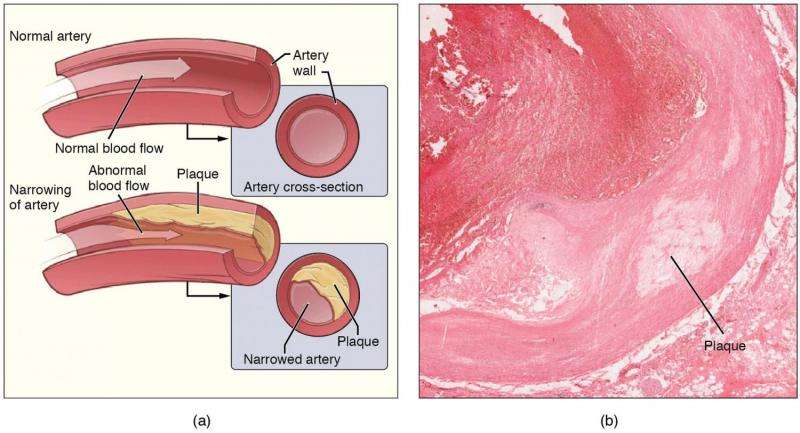This article has been reviewed according to Science X's editorial process and policies. Editors have highlighted the following attributes while ensuring the content's credibility:
fact-checked
trusted source
proofread
In our cellular 'glue,' scientists find answers about heart attacks, strokes and more

University of Virginia School of Medicine scientists have found important answers about strokes, heart attacks, and cardiovascular diseases by probing the biological glue our bodies create to protect us from those deadly dangers.
The researchers, led by Mete Civelek, Ph.D., wanted to understand better factors that influence our risk for cardiovascular diseases such as atherosclerosis and the hardening of the arteries. Atherosclerosis is characterized by the buildup of fatty plaques in our blood vessels. When these plaques form, our bodies build fibrous caps over them to keep them from breaking loose and causing heart attacks and strokes.
Civelek and his team thought that the scaffolding our bodies build over these plaques might contain important clues that could improve our understanding of cardiovascular diseases, the leading cause of death around the world. By taking a clever approach, the scientists were able to obtain important new insights that could advance the development of lifesaving treatments.
"We combined two decades of human genetics findings and a unique resource of smooth muscle cells, an important component of arteries where the plaques develop," said Civelek of UVA's Center for Public Health Genomics and the Department of Biomedical Engineering. "We discovered that our genetic makeup impacts the ways smooth muscle cells secrete proteins that provide strength to plaques and prevent them from rupturing and causing heart attacks and strokes."
Vital cellular glue
To construct the protective scaffolding over the potentially deadly plaques, smooth muscle cells that line our blood vessels secrete what is known as an "extracellular matrix"—a fibrous, glue-like material rich in proteins. Civelek and his team measured these proteins and related proteins in smooth muscle cells collected from 123 heart transplant donors. The scientists were then able to work backward, essentially, to identify genes that made those proteins.
Doing this lets the scientists identify 20 locations on our chromosomes that house genes that influence the production of critical proteins. It also lets them pinpoint a naturally occurring gene variation that puts certain people at higher risk for hardening of the arteries, as well as identify types of proteins that contribute to our cardiovascular risk. Doctors may be able to leverage the new insights to identify patients at greatest risk of having the plaques break free and cause heart attacks or strokes, the UVA researchers say.
The findings also shed important light on why the efforts of the smooth muscle cells are sometimes beneficial and sometimes harmful. That information will be a great asset to researchers seeking to develop new treatments for atherosclerosis and cardiovascular diseases, Civelek says.
"We identified one protein, LTBP1, that we think plays an important role in plaque stability," he said. "We will continue to study if this protein can be a beneficial therapeutic target and hope to translate our findings to patient care soon."
The findings are published in the journal Arteriosclerosis, Thrombosis, and Vascular Biology.
More information: Rédouane Aherrahrou et al, Secreted Protein Profiling of Human Aortic Smooth Muscle Cells Identifies Vascular Disease Associations, Arteriosclerosis, Thrombosis, and Vascular Biology (2024). DOI: 10.1161/ATVBAHA.123.320274





















